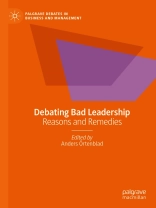“This stimulating collection tackles the question that is uppermost in most of humanity’s minds and hearts right now. The novel debating approach that is taken generates a rich understanding of the range of ways in which bad leadership is created, manifested and most importantly, remedied.” – Professor Brad Jackson , Waikato Management School, The University of Waikato, New Zealand
“In the midst of a world full of incompetent and incoherent leaders this book is exactly what we need: a veritable cornucopia of critical leadership studies.” – Keith Grint , Professor Emeritus, Warwick Business School, UK
“While we like to have leaders who guide, looking at the present state of the world, there are far too many leaders who misguide. It makes this anthology on bad leadership more than timely. The various contributors, taking many different perspectives, highlight the ways leaders can go astray.In these very difficult times, this book will be a must read for anybody interested in this subject.” – Manfred F. R. Kets de Vries, Clinical Professor of Leadership
“Debating Bad Leadership, edited by Anders Örtenblad, is a book for this time! The rise of populism and the emergence of so-called ‘strong’ leaders in many countries have created a social, political, and economic climate that begs for closer examination of the origins, characteristics, and forms of, especially, bad leadership. Taking as its starting-point the question of why there are so many bad leaders in the corporate world, the impressive collection of chapters compiled in Debating Bad Leadership canvasses a comprehensive array of issues ranging from toxic, psychopathic, leadership and ethical failure to issues of poor selection, ill-considered recruitment, leader (in)competence, conflicted or weak followership, to the very concept of leadership itself.In debating these fundamental issues, this book illuminates and educates, and offers some remedies, both theoretically and practically. Debating Bad Leadership challenges scholars, students and practitioners of leadership to continue this fundamental discussion, for the benefit of us all.” – Gabriele Lakomski Professor Emeritus, Melbourne Centre for the Study of Higher Education, University of Melbourne, Australia.
In this book, leadership experts explore why there are so many bad leaders, and suggest remedies for how the current situation could be improved. Some of the experts suggest that reasons for why bad leaders are so common are searched for in people: more specifically leaders-to-become, acting leaders or followers. Others suggest that reasons are to be found in the leadership role (or expectations on those having such role), in the lack of support for leaders, or in beliefs about leadership. On the backdrop of their suggested explanations as towhy there are so many bad leaders, the experts suggest remedies that could be taken to decrease the number of bad leaders as well as their negative impact. The very presumption that this book rests upon also gets its fair share of critique, by some of the experts.
Anders Örtenblad is Professor of Working Life Science at the University of Agder, Norway. He is the editing founder of the book series Palgrave Debates in Business and Management.
قائمة المحتويات
Foreword, by Barbara Kellerman- Preface by Anders Örtenblad.- 1. Background and introduction: Why a book on explanations for the occurrence of so many bad leaders? Anders Örtenblad.- SECTION I. INSUFFICIENT LEADERSHIP EDUCATION.- 2. For the cause of bad leaders, look to bad schooling Robert Sternberg.- 3. The culture of bad organization leadership in Sub-Saharan Africa: Why contexts matter Muhammed Abdulai.- 4. Leadership in education Jacky Lumby.- 5. There is no such thing as a bad leader – just wrong capabilities for our times Fabian Dattner.- SECTION II. INSUFFICIENT LEADERSHIP DEVELOPMENT.- 6. Heads above the rest: The cognitive demands of leading the modern organization Tom Giberson.- 7. Bad Bosses: Realities, Reasons and Remedies Charlie Kerns.- 8. Explaining vs. Responding to Ethical Failuresin Leadership Terry L. Price.- 9. The pending revolution of motives in business leaders. Nuria Chinchilla and Esther Jimenez.- SECTION III. INSUFFICIENT SELECTION PROCESSES.- 10. Ethical Failure and Leadership—Treatment or Selection? Jessica Flanigan.- 11. The Importance of Reflective Practice to Improve Bad Leadership Richard Ladyshewsky.- 12. Why Good leaders make Bad decisions Jo Whitehead SECTION IV. LEADERSHIP POSITIONS TURN THOSE OCCUPYING THEM BAD.- 13. Nordic female leaders and their experiences of ‘bad leadership’: Cases from Iceland Einar Svansson and Sigrun Lilja Einarsdottir.- 14. A Critical Leadership Theory Perspective Jennifer L. S. Chandler.- 15. Shining a light on toxic leadership George Boak.- 16. Bad Leadership: The Role of Bad Followers George R. Goethals.- 17. Shrinkage, Separation and Knowledge Suffocation: Towards a Psychological Politics of Toxic Leadership’ Ricardo Blaug.- SECTION V. MULTIPLE EXPLANATIONS.- 18. How Toxic Employees Ascend to Leadership Clive Boddy.- 19. The Good, The Bad, and The Evil: A social system psychodynamic look at leading Jack Denfeld Wood and Alyson Meister.- SECTION VI. BEYOND BAD LEADERS.- 20. Fake Leadership Makes Bad Leadership Liisa Välikangas.- 21. Bad Leaders? Or a Bad Idea? Richard Little and Jem Bendell.- 22. Why We Have So Many Bad Leaders Today Warren Blank.
عن المؤلف
Anders Örtenblad is Professor of Working Life Science at the School of Business and Law, University of Agder, Grimstad, Norway. He is the Editor-in-Chief of the journal The Learning Organization, and the editing founder of the book series Palgrave Debates in Business and Management.












